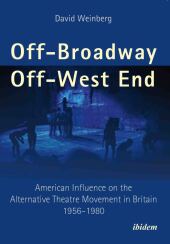 Neuerscheinungen 2017Stand: 2020-02-01 |
Schnellsuche
ISBN/Stichwort/Autor
|
Herderstraße 10
10625 Berlin
Tel.: 030 315 714 16
Fax 030 315 714 14
info@buchspektrum.de |

David Weinberg
Off-Broadway/Off-West End
American Influence on the Alternative Theatre Movement in Britain 1956-1980
Auflage. 2017. 230 S. 210 mm
Verlag/Jahr: IBIDEM 2017
ISBN: 3-8382-1032-8 (3838210328)
Neue ISBN: 978-3-8382-1032-2 (9783838210322)
Preis und Lieferzeit: Bitte klicken
David Weinberg argues that American experimental theatre practice was one key factor in the development of an important phase in the history of the alternative theatre movement in Britain during the period 1956-1980. His analysis draws on key concepts and theories in the work of Elizabeth Burns (1972) and Baz Kershaw (1992, 1999). The main historical developments he covers are the activities of the experimental theatre groups associated with Jim Haynes, Charles Marowitz, Nancy Meckler, and Ed Berman, four expatriate American theatre practitioners living in Britain during the time period 1956-1980.
In addition, he also examines important American-based groups-Living Theatre (1947), Open Theatre (1964), La MaMa (1960), and Bread and Puppet (1965) -which performed in Britain and which made an impact during the same period, as well as a wide range of indigenous British groups-Pip Simmons (1968), Foco Novo (1972-1989), Joint Stock (1974-1989)-, institutions-RSC (1961), Royal Court (1956)-, and individuals such as Max Stafford-Clark, Thelma Holt, John Arden, Ann Jellicoe, and the Portable playwrights (1968-1972) which in one way or another were influenced by American exemplars.
Weinberg´s study is essential reading for everyone seeking a more comprehensive and dynamic understanding of the forces which shaped the alternative theatre movement in Britain.
"Off-Broadway/Off-West End: American Influence on the Alternative Theatre Movement in Britain 1956-1980 offers a fascinating insight into the evolution of British theatre during a twenty-five year period in the second half of the twentieth century. As well as charting the impact of key expats like Jim Haynes, Charles Marowitz, Nancy Meckler, and Ed Berman on the ecology of theatre-making across both the alternative and commercial sectors, it also demonstrates the wide-ranging influence of key US companies who visited Britain during these years. More than a study of how a particular generation of artists came to shape key movements and developments, this is a mode of understanding the unexpected configurations of encounters and intersections that shape theatrical landscapes. Its treatment of new writing initiatives, production strategies and understandings of the relationship between actor and performer, scripting and improvisation, and place and space provide new ways of thinking through the relationship between theatre, history, and memory. The result is an informative, original, and persuasively argued treatment of the ´special relationship´ that brilliantly unsettles established histories of British theatre in the post-War years."-Professor Maria M. Delgado, Director of Research, The Royal Central School of Speech and Drama, University of London


